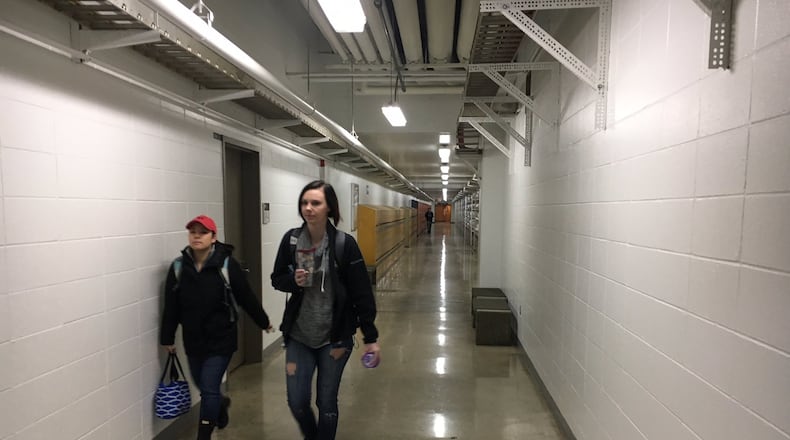“It’s great for any type of weather,” said WSU sophomore Will Lofton of Dayton. “So when it’s raining outside as long as you get in a building upstairs and you come down here you’re good. You can make it to any class on time without getting wet, without being cold and without being too hot.”
RELATED: Wright State settled for nearly $2 million with feds over student aid issues
Wright State’s tunnels are something that sets the school apart from most others in Ohio and even the country as a whole. Wright State is the southern most university with an extensive pedestrian tunnel system.
Wright State’s tunnels link 20 of 22 campus buildings and run nearly two miles underground, according to the university. They are believed to be some of the most extensive on any college campus in the U.S.
With the distinction the tunnel system brings though comes dozens of myths.
Some have said that the tunnels were designed to serve as a bomb shelter for Wright-Patterson Air Force Base while others have heard they were used for laboratories and secret military experiments, WSU archivist Chris Wydman has said.
RELATED: Area community college to open a new location this year in Troy
The truth, Wydman told WSU, is far less fantastical.
When the first two buildings on Wright State’s campus were built in 1964 and 1966, they needed to be connected and were done so through and underground maintenance tunnel, according to the university. Students and faculty apparently began using the tunnels to avoid bad weather.
When the next two facilities at Wright State were built, it was decided they would both have basements and underground hallways connecting them, according to the university. Though the timing of the decision to officially begin using the tunnels for pedestrian traffic is unknown, Wydman told the university that by the 1970s, WSU leaders realized their value.
RELATED: Wright State president: School could learn from branch campus success
More than 50 years after the original tunnel was built, the underground hallways have become a “prime selling point for students with disabilities” WSU’s spokesman said. They make the school more accessible not just to students who have a more difficult time getting around but to everyone on campus.
“It’s a real big advantage having a tunnel system here…as long as you get from the house to the tunnels you’re pretty good,” Lofton said. “The weather doesn’t stop you.”
About the Author
